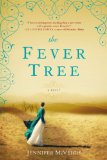Book Club Discussion Questions
In a book club? Subscribe to our Book Club Newsletter and get our best book club books of 2025!
For supplemental discussion material see our Beyond the Book article, Kimberly, South Africa and its Diamond Industry and our BookBrowse Review of The Fever Tree.
Please be aware that this discussion guide will contain spoilers!
- Early in the novel, Frances looks into the Wardian case in her uncle's house and sees the ferns pressed against the glass "as though appealing for escape." She realizes that "the glass case offered protection—the ferns wouldn't last a minute exposed to the pollution of London air—but it would also, eventually, suffocate them." What is the significance of this image?
- In the first chapter, Edwin Matthews admits that he has never liked domesticated plants. He describes Mr. Irvine's roses as "monstrosities—deviations from their true form in nature." Frances reminds him of this conversation in a climactic scene toward the end of the novel when she compares herself to her father's domesticated roses, unable to survive in the wild. Discuss the motif of "monstrous" domestication in the novel, and its importance to the book as a whole.
- Frances is an outsider, rejected by her uncle's family and dismissed by society. To what extent is her desire to belong responsible for the decisions she makes? Can you forgive her for her mistakes?
- Frances describes the women traveling with the Female Middle Class Emigration Society as "cargo being shipped for export. Women without choices." How do you feel about the limited choices presented to women in the novel? In what ways has society changed in the last 130 years?
- Racial prejudice is a constant theme in the novel. The Irish, the Jews, the Boers, and the Africans are all discriminated against. What motivates the various forms of discrimination? What did the novel teach you about racial politics in the nineteenth century? How do these attitudes make you feel about Victorian culture?
- William Westbrook justifies the presence of English speculators in Africa as "the nature of history, of progress." How convincing is he when he wants to be, and why? What—if any—moral code does he live by?
- The novel hinges on a misunderstanding: Frances's belief that Edwin was desperate to marry her. When Edwin tells her the truth, she is stunned. Were you surprised as a reader? What impact did the revelation have on how you felt about both Edwin and Frances? And how does it bring about a shift in power between the two characters?
- When Frances discovers the truth about William and her own responsibility for Mariella's death, McVeigh writes, "it was as if she had woken from a fairy tale and found herself in a world that was starker and more brutal than she could ever have imagined; a world in which she would be held to account." Discuss the significance of the fairy-tale simile here. For what will Frances be held to account?
- What is the importance of the landscape of the Karoo in the novel? How does it test Frances? What is the nature and significance of its beauty?
- Frances tells Edwin about a dream she has, in which a cutting from a tree at Rietfontein has shriveled up into a spiny knot of thorns. "I was upset," she says, "because it was no longer alive and somehow it was my fault." What it is the meaning of the dream, and why is she so devastated?
- In his article for The Diamond Field, Edwin writes: "There is a cancer at the heart of the Europeans' relationship with Africa, and its nature is self-interest." What did you find most shocking about the history of diamond mining in South Africa, as it is set out in the book? How relevant is Edwin's statement today?
- At first glance, the diamond mines of South Africa and the polite society of upper-class London couldn't be more different. Yet are there similarities? Are both institutions built on exploitation? In what ways are they similar? In what ways are they different?
- Discuss the symbolic importance of the fever tree in the novel.
Unless otherwise stated, this discussion guide is reprinted with the permission of Berkley Books.
Any page references refer to a USA edition of the book, usually the trade paperback version, and may vary in other editions.
